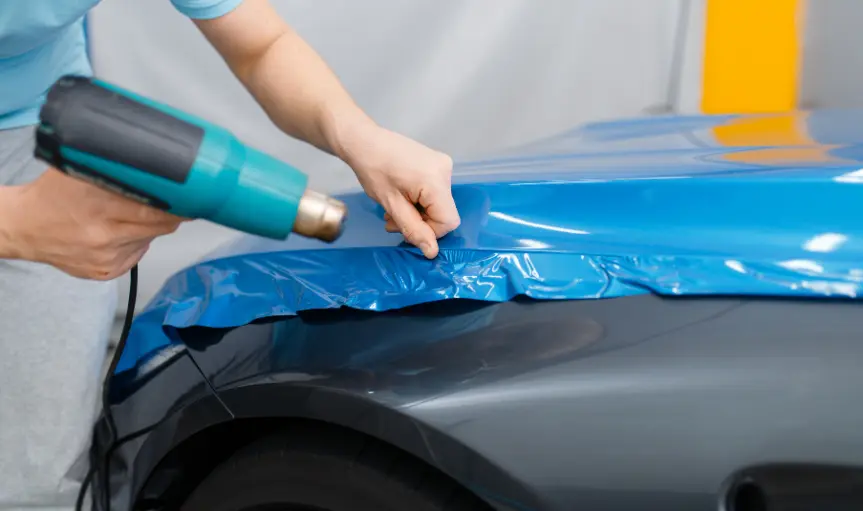When it comes to upgrading your car’s appearance or protecting its original paint, wrapping your car has become a popular choice. A car wrap, which is a vinyl layer applied over the exterior, offers a more affordable, flexible, and temporary alternative to a new paint job. Whether for personal aesthetics, business branding, or simply paint protection, wrapping your car is an exciting way to give it a fresh look.
But how much does it actually cost? The price varies significantly based on factors like the size of your car, the vinyl material used, and the complexity of the design.
Table of Contents
What is a Car Wrap?
A car wrap is essentially a vinyl film that covers the exterior of your vehicle. It can be applied over the entire car (full wrap) or to specific sections (partial wrap) depending on your preferences. Full wraps cover everything from the roof to the doors, while partial wraps may only cover certain parts like the hood or side panels.
Popular reasons for car wraps include personal customization, advertising for businesses, and protecting the car’s original paint.
Factors Influencing the Cost of Wrapping a Car
Vehicle Size & Type:
The larger the vehicle, the higher the cost. That’s because bigger vehicles require more vinyl material and labor time. For instance, an SUV like the Mazda CX-70 would typically cost more to wrap than a smaller vehicle due to its size. Here’s a general price breakdown based on vehicle type:
- Small cars: $2,000–$3,500
- Sedans: $3,000–$4,500
- SUVs & Trucks: $3,000–$5,000
- Luxury cars & exotic vehicles: $5,500–$10,000
Vinyl Material Type:
The type of vinyl you choose plays a big role in the cost. Different finishes offer various looks and durability levels, each at different price points:
- Standard Gloss Vinyl: $2,000–$3,500 for a smooth, shiny finish similar to paint.
- Matte Vinyl: A non-reflective option that’s more modern, slightly pricier.
- Satin Vinyl: A finish between gloss and matte, moderately priced.
- Chrome or Carbon Fiber Vinyl: Premium materials that can push the cost up to $10,000 due to their high-quality and distinct textures.
Design Complexity:
Intricate designs with custom graphics, logos, or patterns increase the cost because they require more labor. The more complex your design, the longer it will take for the installer to apply the wrap smoothly and seamlessly.
Labor Costs:
Labor costs also vary depending on the region. Installers with more experience may charge more, ensuring a professional, bubble-free finish. Labor generally accounts for 50-60% of the total cost, averaging about $3–$4 per square foot
Additional Costs:
Don’t forget additional expenses such as surface preparation (removing dirt, debris, or old wraps), which can range from $500 to $1,000. Wrapping door jambs or other intricate areas could also add around $1,000 to the total cost
Average Cost Breakdown by Vehicle Type:
To make things easier, here’s a quick cost comparison based on the vehicle type:
| Vehicle Type | Estimated Cost |
| Small Cars | $2,000 – $3,500 |
| Sedans | $3,000 – $4,500 |
| SUVs & Trucks | $3,000 – $5,000 |
| Luxury/Exotic Cars | $5,500 – $10,000 |
| Vans | $3,500 – $6,000 |
DIY vs. Professional Wrap: Which is Right for You?
There are pros and cons to both DIY wrapping and professional installation.
- Pros of Professional Installation:
- Precision and durability are guaranteed, especially when done by experienced technicians. Professional installers also offer warranties for the wrap, giving you peace of mind.
- Cons of Professional Installation:
- It’s more expensive compared to a DIY job. Professionals charge not just for the material but also for their expertise.
- DIY Wrapping:
- If you’re on a budget, a DIY wrap kit could cost between $500 and $1,500. However, there’s a higher risk of mistakes like air bubbles or misalignment, which can reduce the wrap’s lifespan. Professionals, on the other hand, offer quality and longevity but at a price of $2,000 or more
Is It Worth Wrapping Your Car? Pros & Cons
Before you decide to wrap your car, consider the following pros and cons:
- Pros:
- Customization: Endless design possibilities from colors to graphics.
- Paint Protection: Vinyl wraps protect the car’s paint from sun damage, scratches, and debris.
- Advertising: Great for businesses wanting to turn their vehicles into mobile billboards.
- Cons:
- Limited Lifespan: Wraps generally last between 5 to 7 years.
- Costly for High-End Designs: Premium wraps and luxury vehicles can be expensive.
- Not Permanent: If you’re looking for a long-term solution, painting might be better
How to Extend the Lifespan of Your Car Wrap
Proper maintenance can help you get the most out of your wrap. Here are some tips:
- Wash your car by hand with pH-neutral soap.
- Avoid high-pressure washers and waxing.
- Store your car in shaded or covered areas to prevent UV damage.
- For extra protection, consider adding a ceramic coating, which can extend the life of the wrap by providing protection from sun and dirt (this costs around $1,200–$1,500)
Alternatives to Vinyl Wraps
One alternative to vinyl wraps is Paint Protection Film (PPF). While it offers similar protection against UV rays and scratches, PPF tends to be more affordable, with costs ranging from $2,500 to $6,000. However, it lacks the custom design flexibility of a vinyl wrap
How to Choose the Right Car Wrap Installer
When selecting a wrap installer, it’s important to:
- Check their reputation and customer reviews.
- Ask about their experience and request to see past work.
- Ensure they offer a warranty for their services. Getting quotes from multiple installers will also help you find the best deal.
FAQs
How much does it cost to wrap a small sedan?
Typically between $2,000 and $3,500, depending on the material and design.
How long does a car wrap last?
With proper care, a wrap can last 5 to 7 years.
Can I remove a car wrap myself?
Yes, but professional removal is recommended for the best results. Expect to pay between $500 and $1,000 for professional removal.
Is wrapping a car cheaper than painting?
Yes, wrapping is generally more affordable than a high-quality paint job.
Does wrapping a car damage the original paint?
No, a wrap protects the paint. However, the car’s surface must be clean and free of damage before applying the wrap
Conclusion
Wrapping a car is an excellent way to protect and customize your vehicle without the commitment of a paint job. While costs vary based on factors like vehicle size, material type, and design complexity, wraps offer many benefits, including paint protection and endless design options. Whether you’re looking to make a personal statement or advertise your business, a car wrap is a great investment.

